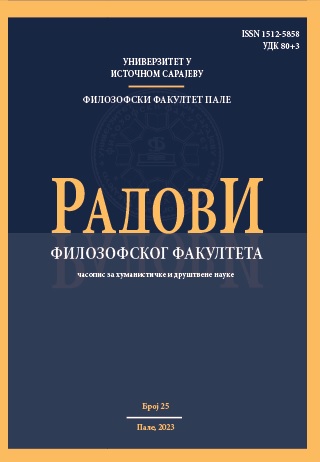МАНИФЕСТОВАЊЕ СЕКУЛАРИЗАЦИЈСКИХ ПРОЦЕСА У ХРИШЋАНСТВУ И ИСЛАМУ
THE MANIFESTATION OF SECULARIZATION PROCESSES IN CHRISTIANITY AND ISLAM
Author(s): Bojan ĆorlukaSubject(s): Christian Theology and Religion, Islam studies, Post-War period (1950 - 1989), Sociology of Religion
Published by: Универзитет у Источном Сарајеву, Филозофски факултет Пале
Keywords: secularization; religion; modern age; Christianity; Islam;
Summary/Abstract: In the sociology of religion, the problems of secularization occupy a special place, because they represent the content of the global process of value transformations in contemporary culture. A special period in the study of secularization by sociologists occurred in the 1950s and 1960s, where they emphasized the process of separating the social sphere from its attachment to religion and religious institutions. One of the established theses is that in modern society, religion increasingly loses its meaning and the process of individualization and privatization of religion appears. Modern society brings with it major and rapid changes. There is a change in social consciousness, value systems, and liberation from traditionalism and conservatism. More and more people resort to a hedonistic way of life, which is accompanied by phenomena such as material wealth, the creation of mass and popular culture, as well as excessive enjoyment of all kinds of entertainment offered by modern society. The first serious study of the process of secularization is linked to German classical sociology. In the early works of Max Weber we can see his interest in secularization, with the fact that he uses the term disillusionment, which he associates with the rationalization of modern society in which there is no space for religion and the religious in modern society. In his study of religion, Durkheim starts from small traditional societies, where he bases his work on the study of totemism. He tries to explain religion by distinguishing between the sacred and the profane. He believed that religion must exist in every society and that its norms must be respected. Similar to Weber, Berger advocates the thesis that in Western societies, people observe society without a religious world view. He puts the rationalization of modern society in the foreground, in which there is a secularization of consciousness. Jinger advocates the thesis that secularization in modern society is egalitarian to the process of losing the meaning of the role of religion, as well as the functions it once had. Secularization is a historically contradictory, complex and meaningful process, which goes through different stages, and neither religion nor religious organizations remain the same and no longer have the same position in relation to society and individuals in it. Secularization processes refer to the disappearance of close identification links with religious values and institutions, whether it is the dissolution of religious beliefs and the reduction of the number of self-declared believers, or a decline in the application of religious practice regulations. In the modern era, the validity and heuristic value of secularization is being re-examined, and the theory itself moves from the secularization of society and the withdrawal of religion to desecularization and the return of religion to the social sphere. The impact of the secularization process can be seen on three levels: the first involves society, the second the church, and the third the individual. The first level refers to the decline of the authority of religious institutions in relation to other institutional spheres of life. The second level can be interpreted as a decline in power, that is, a decline in the control of religious hierarchy structures within religious institutions. The third level includes understanding and behavior, and leads to the secularization of the consciousness of modern man, i.e. the end result is the individualization and privatization of religion. The process of secularization is deeply embedded in the essence of human nature. Although secularization tries to suppress religion, it always remains in the consciousness of man and society. The reason for this is that religion contributes to the knowledge and understanding of the world, the establishment of a normative and value system for the preservation of the individual and the community, encouraging the spiritual development of the individual, and the integration of the individual into the community. The aim of this paper is to present the main manifestations of secularization processes throughout history in Christianity and Islam, as well as contemporary views of secularization in modern society. The authors start from the assumption that secularization processes represent a significant factor in the development of modern society and the attitude of individuals and groups towards religious institutions in Christianity and Islam. Through comparative analysis of historical trends, structural analysis, descriptive and explanatory analysis and synthesis of secularization processes, we come to the conclusion that religion can be suppressed from public life to the margins of social events, but still remains in the consciousness of man and society because historically it represents one of the foundations of the establishment of a normative and value system for the preservation of the individual and the community. Secularization processes in Christianity are manifested in the change of the role of Christianity in the social, state, and national life of people, while in Islam there is a change in the form of the institutionalization of Islam in a secular state.
Journal: Радови Филозофског факултета (часопис за хуманистичке и друштвене науке)
- Issue Year: 2023
- Issue No: 25
- Page Range: 169-187
- Page Count: 19
- Language: Serbian

